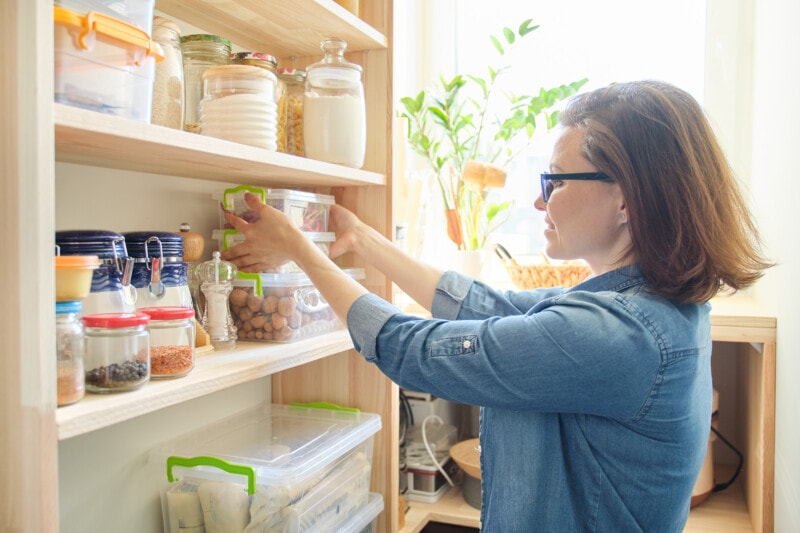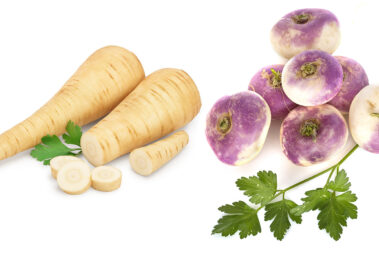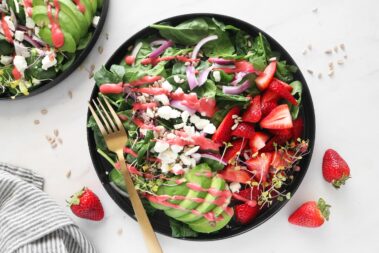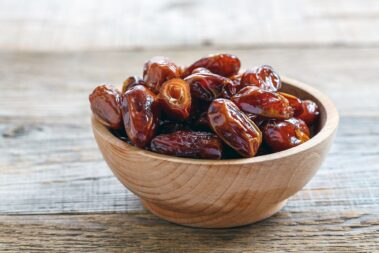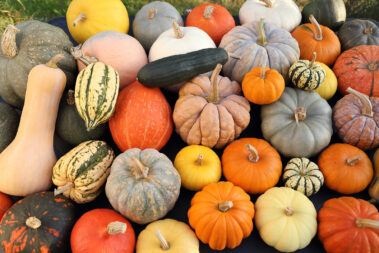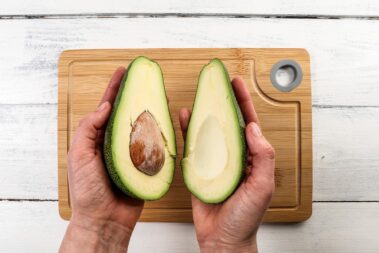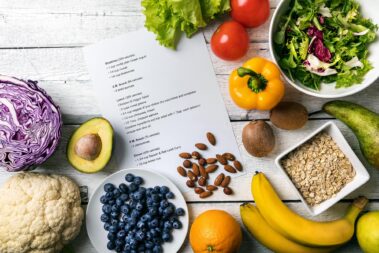Your success with a new (or revamped) vegan diet hinges on your preparation. To help you find that success, we’ve put together this helpful guide for stocking your pantry and refrigerator with all the must-have vegan staples.
Here, you’ll find a comprehensive list of base ingredients needed to throw together most plant-based meals. You’ll also find a few vegan-specific products that are harder to replicate from DIY recipes.
With our guide, your commitment to a healthier you and a healthier planet won’t just be easy—it’ll also be delicious!
Table of Contents
Must-Have Vegan Staples
There are plenty of items worth stocking up on before you embark on a vegan diet. Here is everything you should consider putting into your cupboards and fridge to make meal prep easier.
Vegan Dry Good Staples
When it comes to a plant-based diet, dry goods aren’t just useful for putting down a base of carbohydrates for meals. Many can also be used to create more complex staples, such as plant-based dairy and meat substitutes.
Nuts
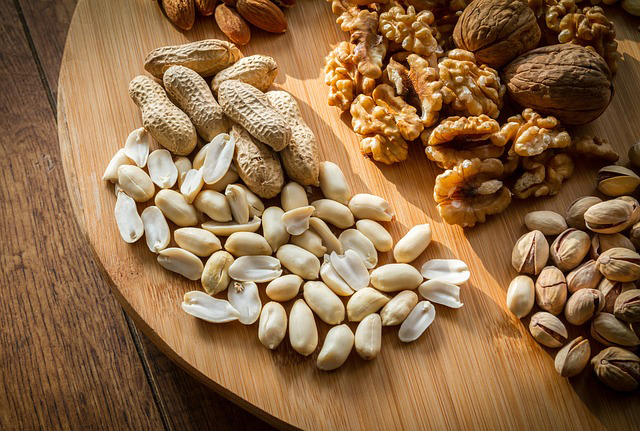
Nuts are a must-have for any vegan connoisseur. Not only do these plant staples provide plenty of healthy energy and omega-3 fatty acids, but they can also be used to create more necessities.
With a high-powered blender, you can turn nuts into dairy-free milk (like almond milk), nut butter, creamy sauces, and tangy yogurt.
Almonds, walnuts, and peanuts are all great to have on hand. But it’s cashew nuts we find ourselves using the most in vegan recipes. Here are just a few examples of things cashews can be used to create:
Spices
Fresh herbs, dried herbs, and ground spices are all necessities in the plant-based pantry. Because healthy vegan meals don’t rely on cheap (but delicious) fats to add flavor, they need these to entice and satisfy.
Turmeric, cinnamon, and cumin are all valuable staples both for their health benefits and complex flavor profiles. Garlic powder, basil, oregano, and cayenne are also used frequently in animal product-free meals.
And of course, don’t forget the salt and pepper.
Pasta
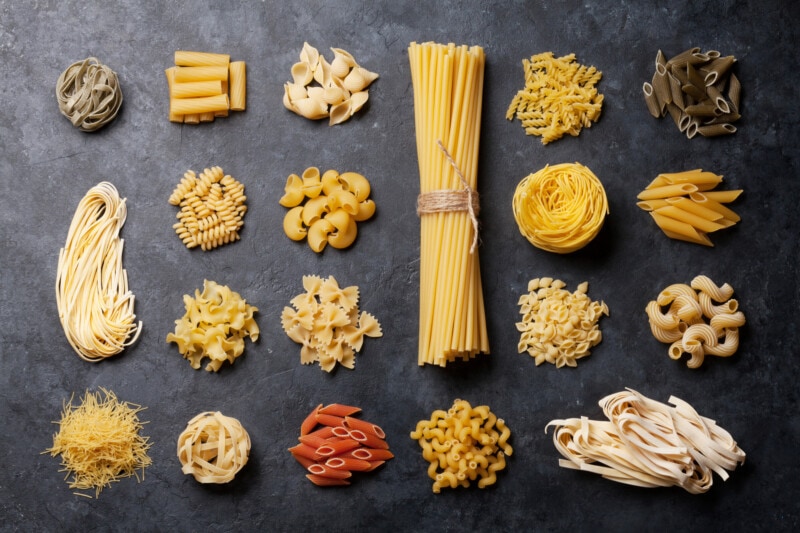
Unless you plan to make your own fresh pasta, having some dry pasta on hand is always a good idea. Bow-tie, spaghetti, and rotini make for easy meals in a pinch.
If you often find yourself in need of quick weeknight meals, it can also be helpful to make some vegan pasta sauce ahead of time. These can be canned for a long shelf life or frozen for near-future use.
Here are some of our favorite simple vegan pasta sauce recipes:
Rice
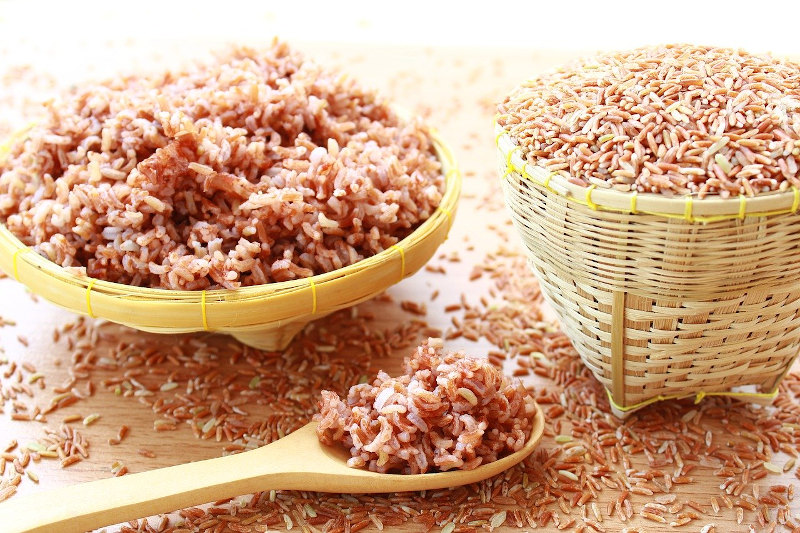
Whether it’s brown rice or wild rice, this common staple is one worth having around. Many Eastern dishes rely on rice as a base for delicious sauces and veggie mixes. Plus, rice is an easy way to add fiber and minerals to your diet (just avoid white rice, as it offers far less nutrition).
If you want to get really crafty, you can even use rice to make your own homemade rice milk.
Quinoa
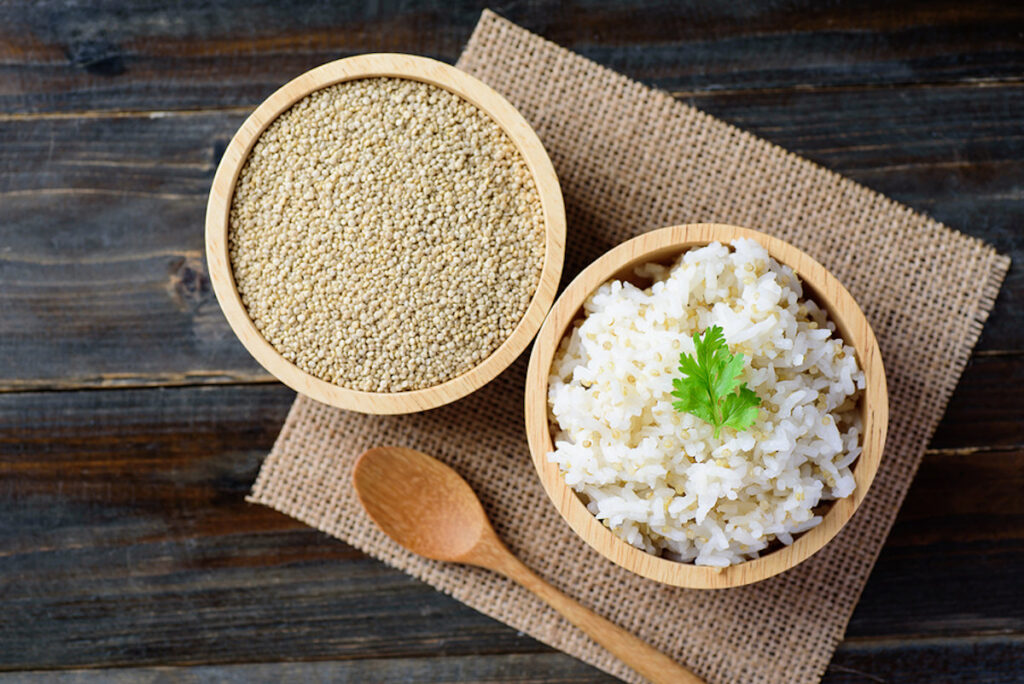
Different from rice in many key ways, quinoa is another dry good staple worth having on hand. Though treated as a grain, quinoa is actually a seed and contains more protein than rice, wheat berries, and other vegan base ingredients. And it contains all the essential amino acids your body needs.
It also cooks faster, making it a better choice for quick meal prep.
There are endless ways to use quinoa in the kitchen. Some of our favorite quinoa-based recipes include:
- Zesty Black Bean and Tomato Quinoa
- Vegan Quinoa Salad with Lemon Vinaigrette
- Vegan Stuffed Zucchini Boats
- Savory Vegan Breakfast Bowl
Beans
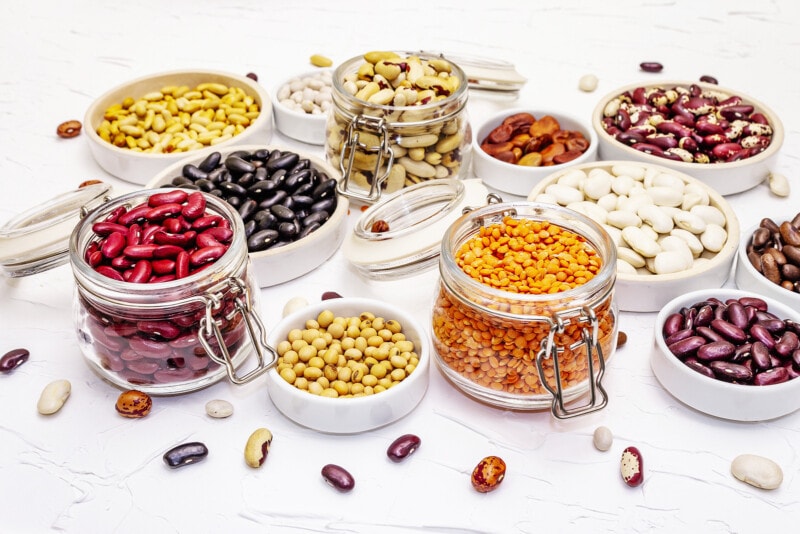
Beans are another dry staple that you just can’t have too many of. For vegans, they are an important source of protein, iron, and other nutrients. They’re also packed with antioxidants and fiber.
We recommend keeping a combination of dry beans, such as black beans and lentils, and canned beans, including chickpeas and kidney beans. This way you’ll have plenty of options for dinner based on how much time you have to prepare it.
Flaxseed
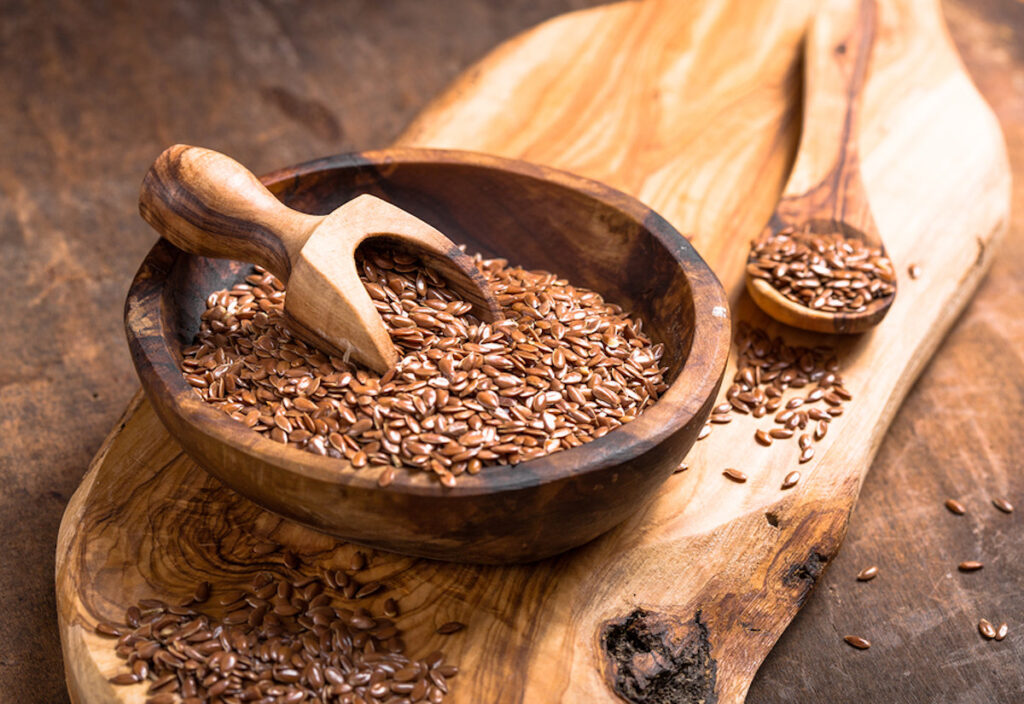
One of the most useful things in a vegan pantry also happens to be one of the smallest. Flaxseeds may be tiny, but they’re also incredibly useful.
Most notably, flaxseeds make one of the best substitutes for eggs in baking. By combining water and ground flaxseed you can quickly create a flax egg capable of replacing the real thing in recipes like cookies, battered vegetables, and waffles.
Flaxseeds are also an excellent source of alpha-linolenic acid. This important omega-3 is great for heart health and lowering cholesterol. Having flaxseeds on hand means you can easily add this healthy fat to your morning oatmeal, smoothies, and yogurt.
Nutritional Yeast
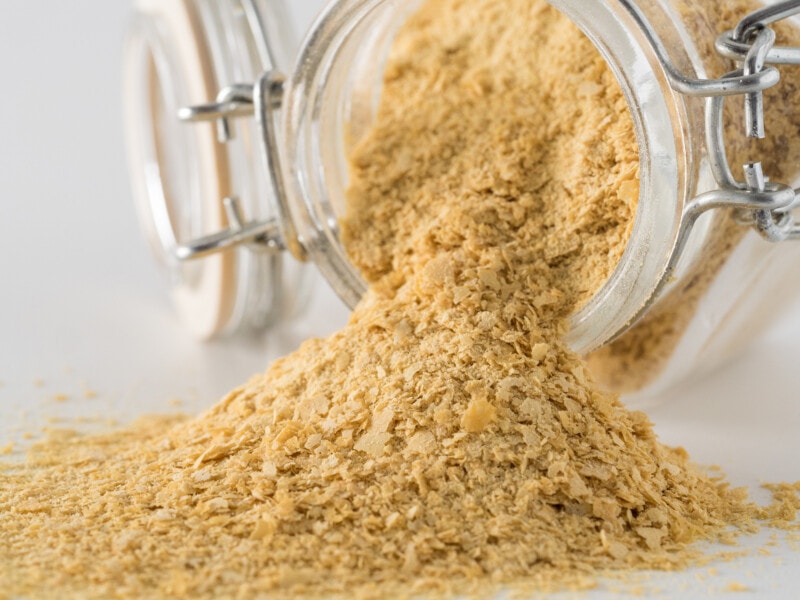
Another small but mighty warrior in the plant-based pantry is nutritional yeast. These golden flakes are one of the few natural sources of B12 in the vegan diet, making it incredibly important to keep around.
Using nutritional yeast is easy given that it perfectly captures the umami flavor of meat and cheese. I use this product frequently as a simple topping for pasta, veggies, and grains. It also makes an excellent Parmesan replacement and is a vital ingredient in most vegan cheese sauces.
Nutritional yeast is now available in most grocery stores and in all health food stores. If you’re having trouble finding it, however, there are some good nutritional yeast substitutes that will work in a pinch.
Agave Nectar
Agave nectar fills the gap left by honey for vegans who want to steer clear of all animal products. This sweet syrup doesn’t have as many of the health benefits of honey, but it does contain helpful phytonutrients that are used like antioxidants in the body.
The other nice thing about agave is that it’s super sweet, which means you need less. It makes a great sweetener for baked goods as well as sauces and marinades.
If you’re having trouble finding agave nectar, maple syrup is another non-animal, all-natural sweetener that works well in recipes.
Dates
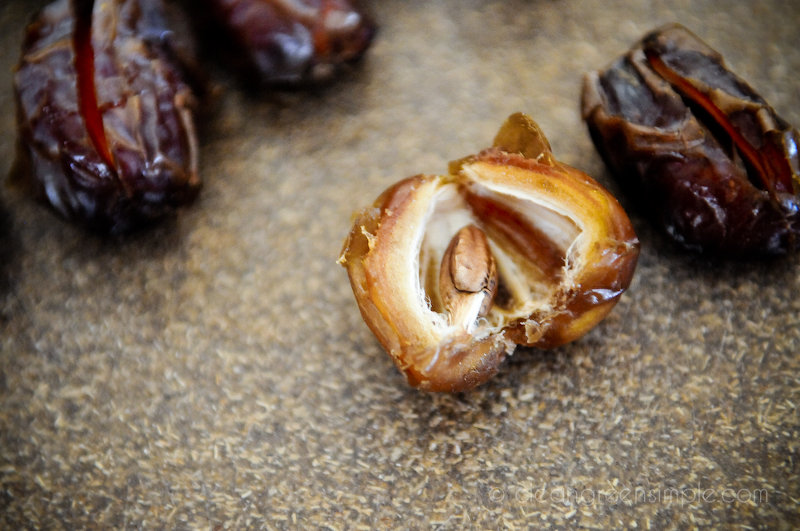
Speaking of sweet, let’s talk dates. These uber-sweet palm products are frequently featured in healthy vegan cooking. Unlike more processed sweeteners, this one is a whole-food option.
This means that all the nutrients in the fruit are still intact and usable by your body. Dates are packed with fiber, vitamins, minerals, and antioxidants. By keeping dates around, you can create sweet treats that you’ll feel better about eating.
Some of our favorite recipes using dates include:
Vegetable Stock
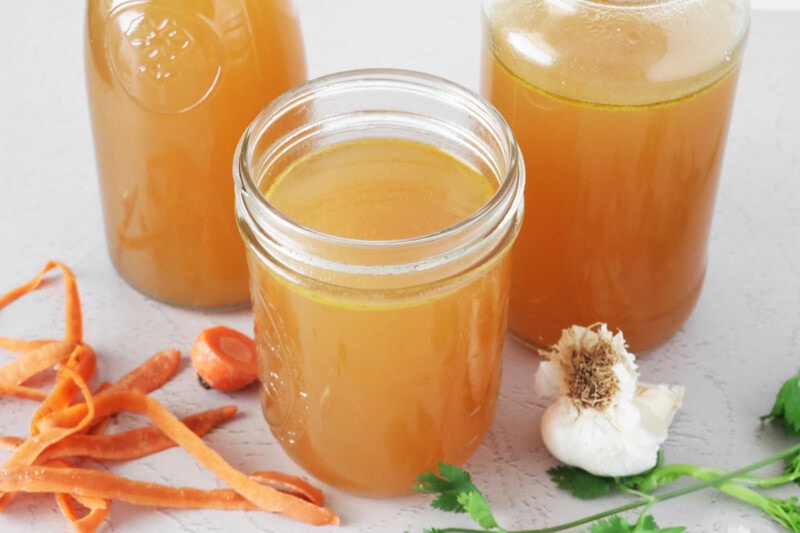
Vegetable stock and broth are versatile elements to have on hand both for making gourmet vegan recipes and for whipping up quick and simple meals. Many recipes that call for chicken or beef broth can be easily turned vegan by substituting the veggie variety.
There are plenty of great organic vegetable broth options at the store. But if you’d rather go the homemade route, this simple recipe is excellent.
Agar Agar
For those new to vegan life, agar agar probably sounds more like made-up baby babble than a keystone ingredient. But if you want to experiment with plant-based Jell-O, penne cotta, cheesecake, and other gelatin-containing recipes, then you need agar.
This red algae extract is the vegan equivalent of gelatin, which is procured from the bones and hide of animals. Agar agar can also be used as a versatile thickening agent in a variety of meals and desserts. You can even make your own vegan marshmallows with this funny-sounding pantry staple.
Vinegar
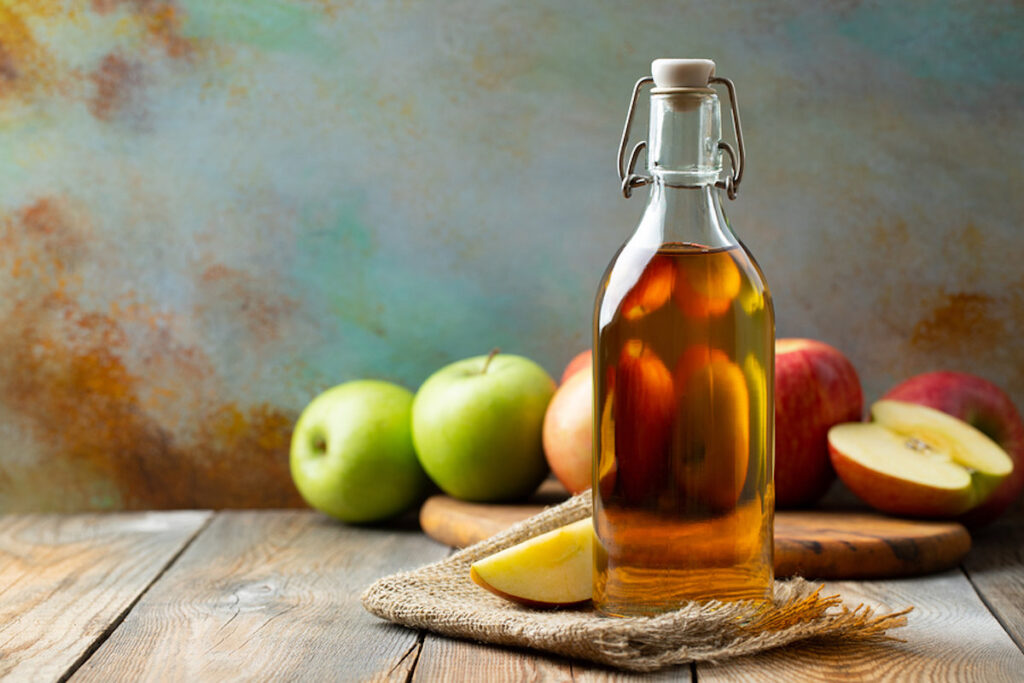
Whether you’re vegan or not, vinegar is likely a staple in your pantry. From rice vinegar to balsamic vinegar, this acidic liquid has a variety of uses.
In the vegan world, a lot of focus is put on apple cider vinegar (ACV). That’s because this unique fermented vinegar can be purchased with the “mother” still inside. Like kombucha, ACV with the mother is packed with probiotics.
ACV is also less acidic than many other types of vinegar and has a more appealing flavor, which makes it useful in dressings, marinades, and baking.
In addition to the various kinds of vinegar mentioned above, we also recommend keeping lime juice and lemon juice on hand. These simple acidic solutions are great for adding flavor to dishes and helping to preserve homemade goods and cut fruit.
Oil
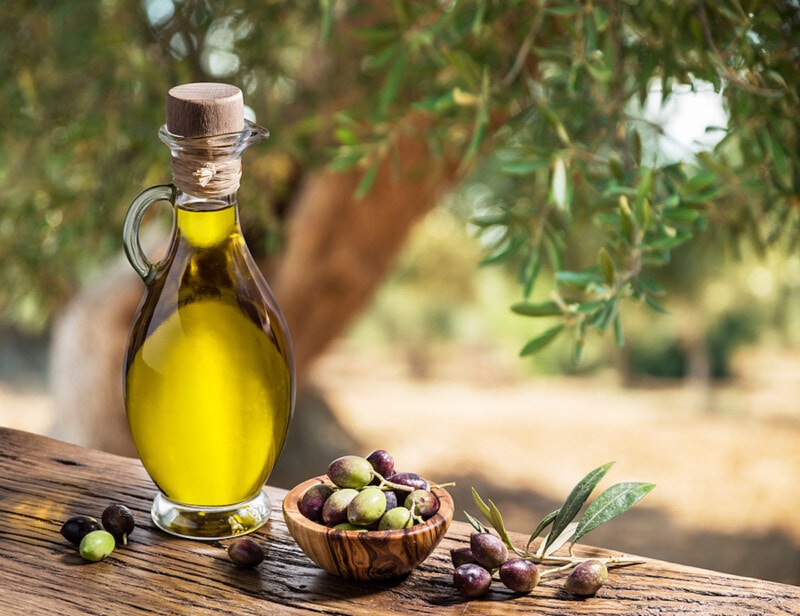
If you’re following a whole food, plant-based diet, then you’ll want to avoid refined oils as much as possible. But for most people following a typical vegan diet, using a little oil here and there is acceptable. When you do use oil, we recommend reaching for extra virgin olive oil (EVOO) first.
When used raw, EVOO offers plenty of healthy fats and antioxidants. And it is one of the most stable oils you can use for cooking.
Another oil you may want to have on hand is coconut oil. This product is unique among cooking oils in that it is solid at room temperature. This makes it a great substitute for butter and highly useful in raw baked goods.
Coconut oil is also loaded with medium-chain triglycerides, which have been shown to have loads of health benefits.
Baking Necessities
If you like to bake, then there are a number of additional staples you should stock your vegan pantry with. These include standard baking ingredients like baking powder, baking soda, cornstarch, and flour.
For vegan baking, you’ll also want to grab some raw sugar or coconut sugar. Most refined sugar is processed using bone char, making it unsuitable for vegans. These other options are free from animal products and easier on your blood sugar.
You’ll also want to look into substitutes for common non-vegan ingredients such as eggs and milk. Here are some helpful resources to get you started:
- Best Vegan Egg White Substitutes
- Best Vegan Condensed Milk Substitutes
- Best Egg Substitutes for Brownies
- Best Vegan Buttermilk Substitutes
- Best Vegan Heavy Cream Substitutes
Staple Foods for the Vegan Fridge and Freezer
In addition to the dry goods listed above, there are also some important cold and frozen foods worth keeping on hand. These will help take some of the work out of your vegan meal prep and give you more options for busy weeknight dinners.
Tofu
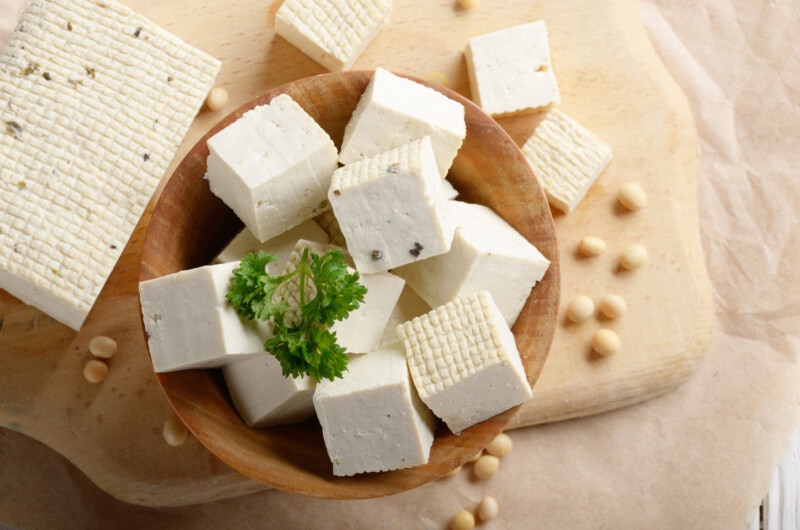
Tofu is a great product to have on hand to add more protein to your diet. With a little seasoning and the right cooking technique, you can easily turn extra firm tofu into a restaurant-worthy meat substitute. And silken tofu makes a simple, healthy thickener for sauces and batters.
This versatile soy product has to be kept in the fridge, but it has a relatively long shelf life.
Some of our favorite tofu-centric recipes include:
Plant-Based Milk
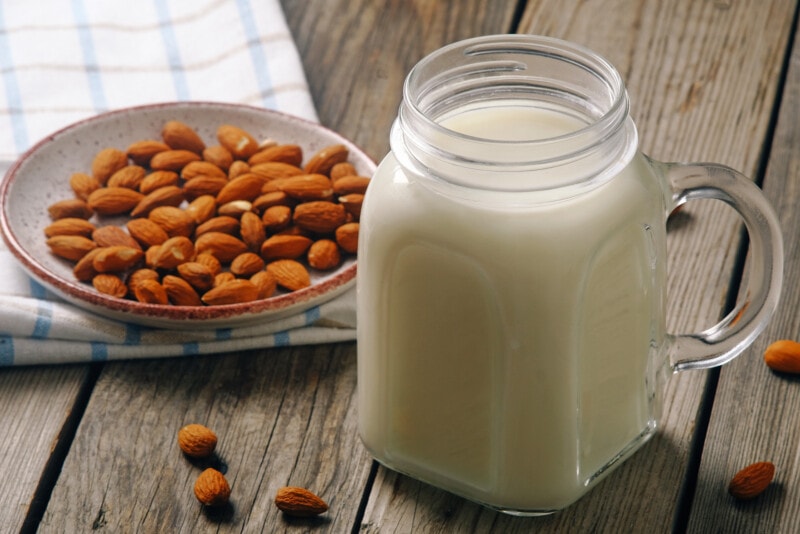
Sure, you can make your own plant-based milk using nuts, oats, or rice in your pantry. But for those days when time is of the essence, having some commercial non-dairy milk waiting in the fridge can be very helpful.
There are a number of great vegan milk brands to choose from. And each type has different pros and cons in terms of flavor, uses, and health benefits.
We recommend keeping a carton in the fridge for those quick-use or emergency situations. They have longer shelf lives than dairy milk when unopened so don’t need to be used as quickly. And many varieties come in shelf-stable cartons that can be kept in the pantry.
Frozen Fruit and Vegetables
Smoothies and protein shakes are a common go-to for those on a plant-based diet. Vegan milk, plant protein powder, and frozen fruit mix up quickly to create a healthy, energizing breakfast.
Frozen fruit, especially frozen berries, provide a ton of nutrients and antioxidants. And in this form, you don’t have to worry about using them before they go bad.
Just like frozen fruit, frozen vegetables can come in handy when you need a quick, healthy meal. They are especially helpful when making stir fry or pasta, or are in need of a simple side to round out your meal.
Non-Dairy Yogurt
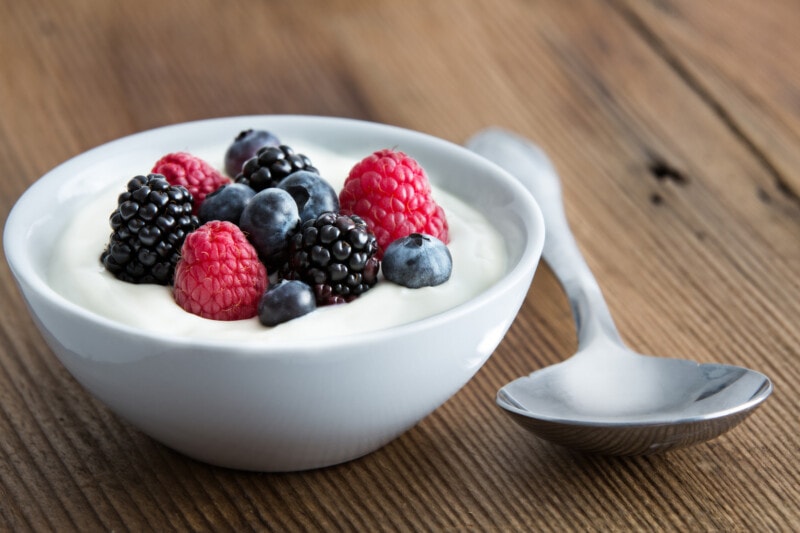
Yogurt is another quick breakfast option that many vegans turn to. It can also be added to smoothies to give them a probiotic boost and used in baking and Indian food recipes. But traditional regular and greek yogurt is not vegan.
Instead, you’ll have to look for nut-based, soy, or coconut yogurt options at the store. There are a ton of great brands out there to choose from (here are 5 of the best).
Yogurt does not keep as long as plant-based milk, but its health benefits and usefulness make it worth having around.
Vegan Mayonnaise
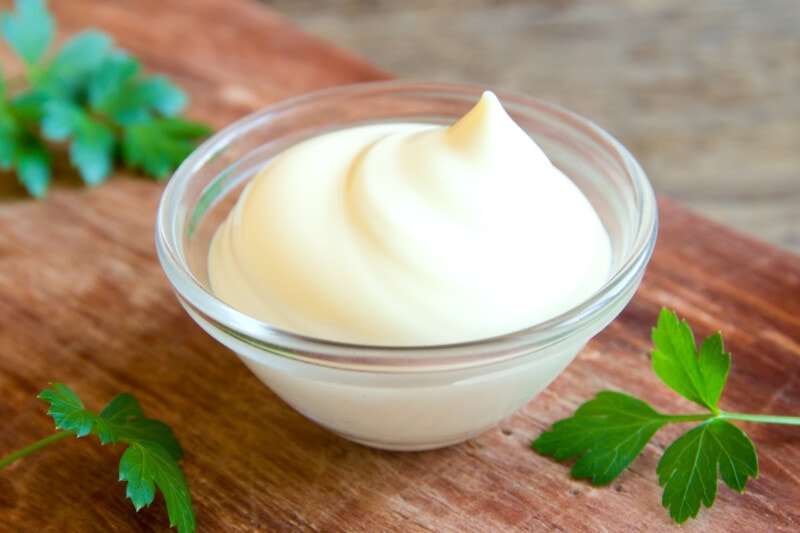
Mayonnaise is one of those condiments that you don’t realize how much you use until you can’t use it anymore. Luckily, there are a few good vegan mayo brands available to satisfy your cravings.
Since this condiment is one of the more difficult to throw together at home, we recommend having a jar in the fridge. Luckily, even if you only use it for the occasional sandwich, most types will last a couple of months after being opened.
Don’t Forget to Rotate
Once you have your pantry stocked with all these delicious plant-based essentials, don’t forget to go through your supplies every few months to rotate out items that are close to expiring.
By keeping up with your supply of must-have vegan staples, your journey to better health for yourself and the planet is as easy as walking to the pantry.
- How to Pick the Perfect Watermelon For a Sweet Summer Treat - April 10, 2024
- Future Kind’s Foundations: A Multivitamin Made for Vegans - December 5, 2023
- Does Nutritional Yeast Go Bad? - November 28, 2023

